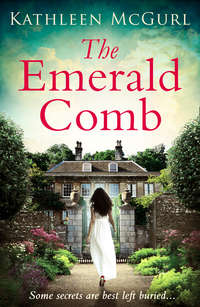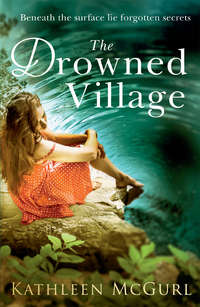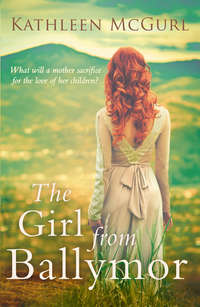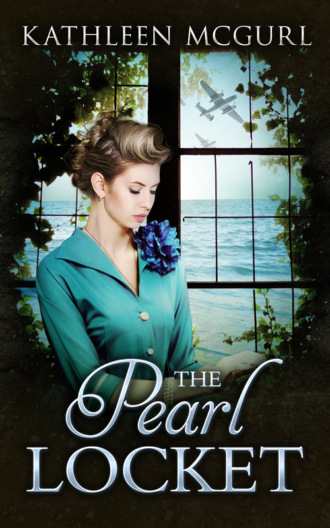
Полная версия
The Pearl Locket: A page-turning saga that will have you hooked

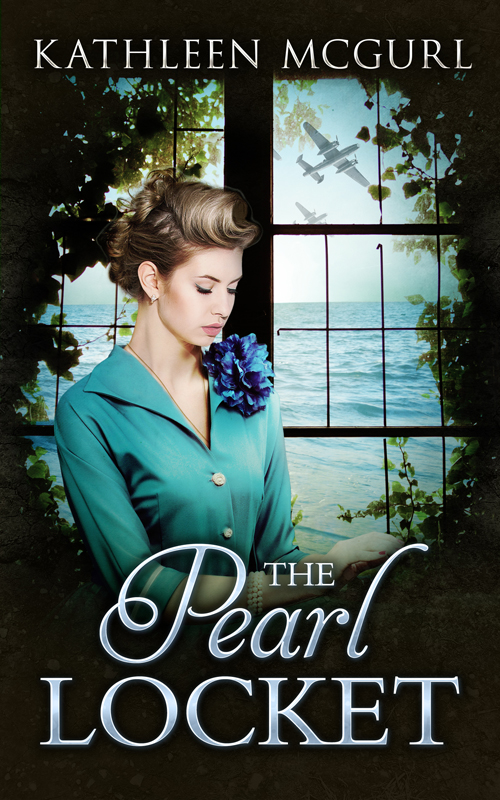
We’ll Meet Again…
When Ali inherits her great-aunt’s house, she doesn’t expect to end up moving her whole family in. Ecstatic to finally own her own home, Ali begins redecorating, going through the rooms, making each one her own with the help of her daughter, Kelly. But when, under the wallpaper in Kelly’s new room, they discover a scrawled message from 1944, Ali begins to question the history of the house as she knows it.
Her family has always seemed so picture perfect, not a blemish or a secret to be found. Yet, this discovery throws her into confusion and Ali begins to question exactly what she knows about her family and the mysteries they have kept hidden…
Moving between 2014 and 1944, The Pearl Locket is a darkly emotional story that will stay with you long after you have turned the last page.
Perfect for fans of Rachel Hore and Kate Morton.
Praise for The Emerald Comb
“…exciting, fast-paced and impossible to put down…”
– Books Reviews by Em
“Two stories: one historical, the other contemporary, cleverly interwoven with conflict, mystery and passion…an absorbing read”
– Jane Hunt
“Infuriatingly well-written…an intelligent and refreshingly different read”
– Read Reviewed
“Totally worthy of five of my cupcakes, and more. I cannot recommend this book enough!”
– Becca’s Books
“An edge of your seat read, that is a page turner and gripped me from page one”
– Comet Babe
“…beautifully written and left you wanting more. More of everything.”
– Feed Me Into Books
Also by Kathleen McGurl
The Emerald Comb
The Pearl Locket
Kathleen McGurl

www.CarinaUK.com
KATHLEEN MCGURL
lives in Bournemouth with her husband and teenage sons. She always wanted to write, and for many years was waiting until she had the time. Eventually she came to the bitter realisation that no one would pay her for a year off work to write a book, so she sat down and started to write one anyway. Since then she has written several books and sold dozens of short stories to women’s magazines. She works full time in the IT industry and when she’s not writing, she’s often out running, slowly. For more information or to get in touch, please visit kathleenmcgurl.com or follow @kathmcgurl on Twitter.
Firstly, enormous thanks to my wonderful sons. Fionn McGurl once again acted as beta reader, and Connor McGurl gave me some extremely valuable boy perspective for ‘Jack’s chapter’. I could not have written that part without his help. And to my husband Ignatius, who is always there, putting up with me rambling on about my work-in-progress at every possible opportunity. Thanks also to my editor Victoria Oundjian for her expert help and guidance shaping the final version of this novel.
Writing is a solitary pursuit, so finally I’d like to thank my groups of writer-friends, in particular the Write Women and the Carina UK authors, for their continuing friendship and support which keep me going when times are tough.
For Mum, my greatest fan
Contents
Cover
Blurb
Praise
Book List
Title Page
Author Bio
Acknowledgement
Dedication
Chapter One
Chapter Two
Chapter Three
Chapter Four
Chapter Five
Chapter Six
Chapter Seven
Chapter Eight
Chapter Nine
Chapter Ten
Chapter Eleven
Chapter Twelve
Chapter Thirteen
Chapter Fourteen
Chapter Fifteen
Chapter Sixteen
Chapter Seventeen
Chapter Eighteen
Chapter Nineteen
Chapter Twenty
Chapter Twenty-One
Chapter Twenty-Two
Chapter Twenty-Three
Chapter Twenty-Four
Extract from The Emerald Comb
Endpages
Copyright
Chapter One
July–August 2014
‘So, this is it,’ Ali said, gazing up at the house. ‘It’s smaller than I remember. But I was just a child when I was last here.’ She had only vague memories of being here before—muddled images of an imposing, double-fronted art-deco-style house, with bay windows, a large garden and, best of all, the beach just a couple of minutes’ walk away. It had been her spinster great-aunt’s house, and the childless Betty had left it to Ali in her will.
‘Smaller?’ said her husband, Pete. ‘It’s huge! Well, compared with everywhere else we’ve ever lived.’
Ali nodded. She couldn’t argue with that. But the size didn’t matter, as she was going to put the house on the market immediately. They had no intention of living in it. ‘I suppose we should have a look round inside, now that we’re here.’
‘Well, that was the point of the visit,’ Pete said, smiling. He took Ali’s hand and led her to the front door. She was grateful for the gesture of support. It was strange being here. Although the house now belonged to her, it didn’t feel like it did. She’d never owned a house before; they’d always rented. She felt like an intruder. The front door was stiff—Betty had spent the last couple of years of her life in a nursing home, and apparently very few people had entered the house in that time. A pile of junk mail lay on the doormat. Ali gathered it up and placed it on a dusty sideboard in the hallway. She glanced around.
‘What a state. I guess we’ll have to clear everything out before we can sell it. What’ll we do with all the furniture? I suppose we might want to keep a few pieces but not much.’ She opened a drawer in the sideboard. It was full of pens, coins, elastic bands, buttons, old receipts and other odds and ends. ‘And we’ll have to sort all the contents out as well. Gran might want to keep a few things. It’s going to be a huge job.’
Pete had peeked into a room on the left—the sitting room as far as Ali recalled—and was now crossing to the room on the right, the dining room. He turned back to Ali with shining eyes. ‘Fantastic rooms, those two. Great proportions. They’d look amazing if they were done up. Come and see the kitchen.’ He pulled her to the back of the house where they entered a large but very dated kitchen. Probably last fitted out some time back in the sixties, Ali thought, wrinkling her nose at the musty, unlived-in smell. ‘Imagine it, Ali, with a run of units along that wall, an island there, an American-style fridge-freezer there, granite worktops and Shaker-style cupboard doors. This house could really be something special.’
It could; she could see that. Someone else with money and the time and energy for an awful lot of DIY would have a lot of fun with this house. She just wanted her hands on the money they’d get from selling it. With Pete’s redundancy money fast running out and their landlord about to put up the rent, they could certainly do with it. She was already working full time, and as yet Pete had had no luck finding another job since Harrison’s had laid him off.
‘Let’s go upstairs,’ Pete said, again reaching for her hand. She followed him up. The stairs turned on a half landing, a grand newel post supporting the oak-panelled banisters. There was a cold draught as they turned the corner. Ali shivered. ‘There’s a crack in that window,’ Pete said, nodding at the bowed and leaded window on the half landing.
Upstairs were four double bedrooms, a box room and a bathroom. As a child Ali had never been up here. She’d only ever paid a few duty visits to her great-aunt, with her father, so many years ago.
As they gazed out of the front bedroom window, from where you could just about get a glimpse of the sea, Pete turned to Ali. ‘What if,’ he said, with a glint in his eye, ‘we didn’t sell up? What if we cleared it out, then moved in?’
‘Pete, it’s in a horrible state! And we need the money from the sale. You know we do.’
‘We could use the rest of my redundancy money to do it up. And if we didn’t have to pay rent, we could easily live off your salary for a while. Think about it, Ali! If this place was modernised and redecorated, it’d be worth twice as much. Then we could sell it, if we still needed the money, and buy somewhere smaller. But with luck I’d get a job then, and we could just stay here.’
Ali opened and closed her mouth a few times. So many thoughts were racing around her head she didn’t know which one to articulate first. ‘But, Pete, the risk! What if the property market goes downhill and we can’t sell it? What if we run out of money before we’ve finished doing it? What if you get offered a job but it’s away from here and we need to move to another town?’
Pete smiled at her and shook his head. ‘Don’t just look at the negatives. There are loads of positives. The kids would love this house. Ryan could kick a football around in that garden. And look how close we are to the beach—Kelly would adore that! But at least you didn’t say no. Does that mean you’ll consider it?’
Ali sat down on the bed. It had a pink candlewick bedspread neatly placed across it. A puff of dust rose up around her and she flapped it away. ‘The safe option is to sell. Some property developer would probably snap it up quickly, at the right price. And then we could buy a smaller, cheaper house, perhaps a little further from the sea. We’d be rent and mortgage free, and wouldn’t have a big mess of a house to do up. And we’d have a big pot of money in the bank to add to what’s left of your redundancy. Then you could concentrate on finding another job.’
‘You’re right.’ Pete sat down beside her and put an arm around her shoulder. Ali was surprised he was giving in so quickly. Usually once he had an idea in his head he’d keep at it, trying endless different angles, until she either gave in and agreed or threatened to cut up his prize Munster Rugby shirt signed by the entire team of 2008 if he mentioned it even one more time. ‘That would indeed be the safe option. And the boring option. Ali, you only live once! This would be a fabulous house to live in, even if it’s only for a year or two while we do it up. And we could make a fortune on it. If we sell it as it is, we’d barely have enough to buy another place big enough for the four of us. There’d certainly be none left over. But if we do it up and then sell it, we could buy a smaller place and have stacks of money spare for holidays or cars or a new handbag for you or whatever you’d want. Or—’ he looked sideways at her ‘—to help finance the kids through university.’
Ali smiled wryly. He always knew which buttons to press. The thought that they might not be able to help first Kelly and then Ryan with their university living expenses had always tormented her, especially since Pete had been made redundant. They’d never had enough to be able to put some by for that purpose, but she was determined that the kids would go to university if they wanted to. Even if she had to ask her parents, who’d retired to Spain, for financial help. Great-aunt Betty’s will had meant they’d be financially secure, buying a house and living off Ali’s salary until Pete found a job. But now, this plan meant that in a year or two there could be a lot more money on top. Did they dare take the risk? Another thought struck her. ‘But Pete, who’d do the work? This house would need so much doing and we’d be living in a building site for months.’
‘I’d do it. Except for the electrics—I’d get a professional in for that. But I’m quite handy, you know. And we could go room by room, so some of it is liveable while we do up other rooms. I’d do some of it, the really disruptive stuff like the kitchen, before we move in. We’ve got to give a month’s notice to the landlord anyway. And as probate’s complete and this house is yours already, there’s no reason I can’t start tomorrow. If you agree, of course. It’s your house…’
He was giving her that puppy-dog look, the one that always made her melt. Ali still had misgivings about the project but there was some sense in what he said, and maybe it would work out. ‘I suppose—it’s not as if the decision is irreversible—we could give it a go. We could always put it on the market later if things changed or the work was too hard for you.’
Pete flung his arms around her and kissed her. ‘I love you, Mrs Bradshaw! The work won’t be too hard for me; I’m a man not a mouse! Right then, I’ll get started today. First things first, I’ll need to hire a skip. Can you go through and mark all the things you want to keep? Wow, the kids are going to be so excited when they hear we’re moving in!’
‘I can’t believe how unlucky we are with the weather today,’ shouted Ali to Pete, over the noise of the lashing rain, raging wind and swearing removal men. She pushed a strand of wet hair out of her eyes and stood aside to let two men past her into the house, carrying sodden boxes. Of all the days to get a huge summer storm, why did it have to happen on their moving day? It was just a month after they’d visited the house for the first time.
Things had started well that morning. The van had arrived on time and everything was loaded into it within four hours. The keys had been handed back to the landlord. Both the family and the removal men had gone for lunch then met outside number nine at three p.m. to unload. But as soon as the van had pulled up outside it had begun to rain, and now it was coming down in sheets.
‘Bugger!’ The sound of smashing glass and swearing sent Ali running out to the back of the van. One of the removal men was standing amid a pile of broken wine bottles, with a wet bottomless cardboard box in his hands.
‘Er, sorry love, the box got wet and the bottom just gave way. Saved one. Look.’ The man held out one bottle, which had stayed in the box. Ali took it and sighed. There goes our wine cellar, she thought. At least there was one left intact to celebrate their move later this evening.
‘Don’t worry; it wasn’t your fault. I’ll find a broom and clear this lot up.’ She went inside in search of the cleaning equipment. Maybe it was still on the van, but she thought she’d seen someone come in with an armful of mops and buckets earlier.
Inside, Pete was shifting boxes around in the newly fitted kitchen to make way for those yet to be unloaded from the van. ‘Who’d have thought we had this much stuff?’ he said. ‘The rented house was half the size of this one, but I’m wondering where on earth we’re going to put everything.’
‘It’ll be OK when we unpack. Seen the broom?’
‘Downstairs loo.’
‘What’s it doing in there?’
‘Removal bloke thought it was an under-stairs cupboard and just dumped it and a pile of other stuff in there. We’ll sort it later, I thought.’
Ali shrugged and went to collect the broom. Passing the bottom of the stairs she came across seventeen-year-old Kelly, who was sitting on the third step, phone in hand, composing a text.
‘Kelly, love, you’ll be in the way there. Can’t you go up and start organising your bedroom?’
‘Yeah, Mum. Will do. Just updating Matt on progress. Is it cool if he comes round tomorrow? He said he’d help sort out my new room.’
Ali nodded. She liked her daughter’s boyfriend. He was a pleasant, steady lad and a good influence on Kelly. ‘Of course he can come. But you’ll have to do some of the sorting out tonight, or you’ll be sleeping amongst piles of boxes.’
Two men pushed past carrying a chest of drawers destined for thirteen-year-old Ryan’s room. Ali grimaced as she saw how the rain had caused the veneer to lift off around the front edge. Well, it was only a cheap thing. They’d probably have to buy some better furniture more in keeping with the house. She turned back to Kelly. ‘Come on. Out of the way. Go up and make a start.’
Kelly stood up and slipped her phone into her jeans pocket. ‘OK. It’s such a nightmare up there, though. I don’t know where to start.’
‘You and me both, love,’ Ali said. It was exciting moving into a house they owned, but daunting as well. And she still had occasional misgivings about whether it had been the right thing to do. She shooed the thoughts out of her mind and went back outside into the rain with the broom.
Eventually, after hours of chaos, the removal men left, and the family were sitting in the living room on a jumble of sofas, chairs and boxes, eating take-away pizza. Ali had managed to find the box containing the wine glasses, and was opening the only unbroken bottle of wine.
‘Can I have some, Mum?’ Kelly asked.
‘Why not? We’re celebrating,’ Ali said, smiling, as she poured out three glasses.
Ryan made a face. ‘Ugh, wine’s disgusting.’
‘None for you, anyway,’ said Pete. ‘You stick to your lemonade.’
‘Well, cheers, family,’ said Ali, raising her glass. ‘Here’s to our new home. I hope we’re going to be really happy here. It’s twice the size of our old house, close to the beach, nearer Ryan’s school, nearer the station for Kelly to get to college, and renovating it will give your dad something to do until he finds a new job. Everyone’s a winner!’
‘Cheers!’ said Pete, clinking his glass against the others. ‘Which room shall I decorate next?’
‘Sitting room,’ said Ali. ‘So we have somewhere nice to bring guests into. I can’t bear this worn out, stained carpet.’
‘Mine,’ said Ryan. ‘I love how big my room is but I hate that flowery wallpaper.’
‘Well my wallpaper is already peeling off, around the sink in the corner,’ said Kelly. ‘Also I’ll be moving out in another year and a half when I go to uni. So it makes sense to do mine first so I get a chance to enjoy it.’
Pete laughed. ‘Looks like I’m going to be a busy boy, doesn’t it? Well, you can all chip in and help me get it all done.’
Ali smiled. She wouldn’t be chipping in to help. She was the breadwinner in the family at the moment, and the chief cook. It would be exciting as Pete worked his way through the house, renovating each room. He’d done a great job on the kitchen, though it wasn’t completely finished yet. He’d also managed to get an electrician to do most of the rewiring before they moved in, but they needed a new central heating system and a new bathroom as well as all the general decorating. They’d done the figures and it looked as though the remains of the redundancy money would just about cover the work. It’d be tight, but if they budgeted carefully, and if Pete got a new job quickly after the work on the house was done, they’d manage.
After everyone had finished their pizzas and the boxes had been put out in the recycling bin, Kelly and Ryan went upstairs to sort out their rooms or—more likely, Ali thought—text their mates. She and Pete stayed in the living room, finishing the bottle of wine. Pete was on the sofa in the middle of the room, and Ali went to join him, curling up beside him. Outside the rain was still lashing down.
‘Once we’re sorted, we’ll have to get that chimney swept so we can have a real fire in the winter,’ Pete said.
‘Mmm, that’d be nice,’ Ali replied. She could picture the room, decorated, with new curtains and a blazing fire in the grate. It was a big room but well proportioned and she was sure she could make it look cosy. ‘The kids seem happy with the move. I’m glad about that. You never quite know how they’ll react.’
‘What’s not to like, here? It’s not as though we’ve taken them away from their friends or schools or anything. And with the beach just down the end of the road, they’ll have a fabulous time all summer. You’ll be forever sweeping up sand and washing beach towels, I bet.’
Ali laughed. ‘They can sweep up their own sand. Anyway, tomorrow shall we call on our new neighbours and introduce ourselves?’
‘Good idea.’ Pete kissed the top of her head. ‘And when do you want to bring your gran round? It’ll be quite a surprise for her that we’ve moved here, after you’d told her we were going to sell it.’
‘Next weekend, I think, once we’ve got everything straightened out. I think she’ll be delighted we’ve moved in and are bringing the house back to life again. It’s been empty so long. This is where she grew up, of course.’
‘She must have such happy memories of living here,’ Pete said. ‘Shame Margaret didn’t get on with Betty in her later years.’
‘I’m not sure she ever got on very well with her,’ Ali replied.
Chapter Two
January 1944
There was no jam for tea. No cake, either. Just plain bread and margarine, and one rich tea biscuit each. Joan craved something sweet, anything sweet. She poured herself a cup of tea, dipped her teaspoon in the sugar bowl and tried to heap it up as much as possible without being noticed.
‘Put that sugar back at once! No more than a quarter teaspoon per cup of tea. You know the family rules.’ Father glared at her from the other end of the table. Joan shook the spoon so that most of the sugar fell back into the bowl, and meekly stirred in the remaining quarter. She tasted her tea and grimaced. Her sister Mags, who was sitting next to her, winked in sympathy, and whispered, ‘You’re sweet enough already.’ They were sitting in the dining room, the second-best lace tablecloth spread over the table. War or no war, Father insisted on sticking to traditions and doing things ‘properly’, as he put it. They were firmly in the middle class, and he refused to let standards slip. Joan thought it all a complete waste of time and effort. Why couldn’t they just eat their tea at the kitchen table? So much less fuss and work!
‘Mother, when do you think rationing will end?’ she asked. Her mother smiled weakly and looked at Father. Just like Mother. She wouldn’t dare answer a question like that herself. She would always defer to the head of the household. That was why Joan had directed the question to her mother—just to stir things up a bit.
‘Not until this war’s over. We all have to put up with it until then, so stop making such a fuss. You’re not a baby any more.’ Father gave her a stern look, and tapped the side of his cup with his teaspoon. Joan sighed as her mother immediately leapt into action, pouring her husband a second cup of tea. Why was she such a doormat? If Joan ever married she liked to think she and her husband would be on a much more equal footing than her parents were.
‘Would you like more bread and margarine, Father?’ asked her other sister Elizabeth, pushing the serving plate towards his end of the table.
‘Thank you, Betty,’ he said. Stuck up Elizabeth, sucking up to Father as always, thought Joan. Another doormat. Well, it was now or never. She knew what the answer would be, but she had to ask anyway. Nothing ventured, nothing gained, as Mags would say.
‘Father, may I ask a question?’
‘Not if it’s anything more about rationing, child.’
‘No, it’s something else. The thing is, there is a dance on at the Pavilion tomorrow evening, to celebrate the New Year, and I would rather like to go.’
Father put down his teacup and stared at her over the top of his horn-rimmed spectacles. Joan forced herself to keep her eyes on his. If she looked away she’d lose her nerve.
‘You? But you’re far too young to be attending dances. You’re only sixteen.’
‘I had my birthday yesterday. I’m seventeen, Father.’



